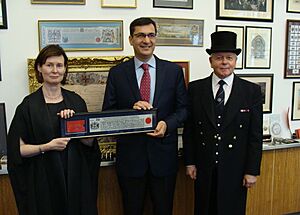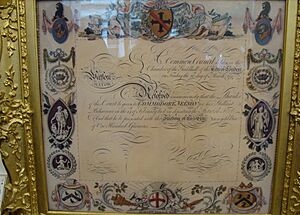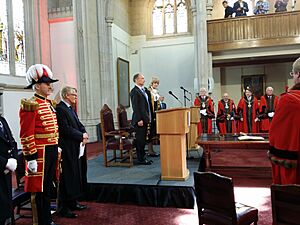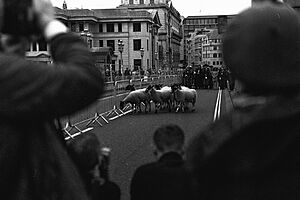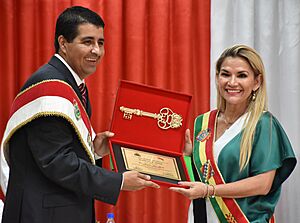Freedom of the City facts for kids
The Freedom of the City is a special honor given by a city or town to someone important. It can be given to a person who has done great things for the community, or to a famous visitor. Sometimes, it's also given to military groups that the city trusts.
This tradition started a long time ago, in the Middle Ages. Back then, being a "freeman" meant you weren't tied to a lord like a serf. You had special rights, like being able to trade and own property in the city. Today, the title doesn't give special rights, but it's still a very respected honor in many countries, including the United States, United Kingdom, Canada, and Australia.
Sometimes, instead of the "Freedom of the City," people might receive a Key to the City. This is also a symbolic honor, like a special welcome to the city.
Contents
Military Freedom of the City
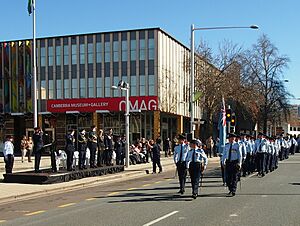
The Freedom of the City is an old honor given to military groups. It allows them to march through the city with "drums beating, flags flying, and bayonets fixed." This means they can parade with all their military gear, which was a big deal in the past.
This tradition goes back to ancient Rome. Roman generals and soldiers were not allowed to enter the city with their weapons. The city had a special boundary called the "pomerium" that was considered sacred. Only during special victory parades, called "triumphs," could a general enter the city with his army for one day.
Later, in medieval Europe, cities also had rules to protect themselves, even from their own king's soldiers. Soldiers often had to camp outside the city walls. The Freedom of the City was given only to military units that the people trusted, perhaps because they had done something brave or were a familiar, friendly presence.
Today, giving the Freedom of the City to a military unit is a special ceremony. It's usually given to groups that have a long history with the area. It shows how much the city appreciates their service. The ceremony often includes a parade through the city streets.
Civilian Freedom of the City
Another type of Freedom of the City is for regular citizens. In medieval times, this "free status" was very important. It meant you had rights like being able to trade and own property in the town. It showed you were a "freeman" and not a "vassal" (someone tied to a lord).
Today, giving honorary freedom to a person is mostly a symbolic ceremony. Local governments give it to people who have done amazing things for their community or to honor special visitors.
Freedom in the United Kingdom
In the United Kingdom, before 1832, having the Freedom of the City or town often meant you could vote for members of Parliament. Over time, laws changed, and more people gained the right to vote.
Today, cities, boroughs, and even parish councils can give the honorary title of "freeman" to "persons of distinction" or those who have "rendered eminent services" to the local area. This means people who are very important or have helped the community a lot. A special meeting of the council can grant this honor with a two-thirds vote.
The rules for becoming a freeman can be different in each city. For example, in Chester, only the children or grandchildren of freemen can apply. In York, it can go back even further, and people who learned a trade through an apprenticeship to a freeman can also become one.
Freedom of the City of London
The Freedom of the City of London is one of the most famous. It has been recorded since 1237. You can get this freedom in a few ways: by inheriting it (if your family members were freemen), by completing an apprenticeship, or by being nominated. You can also get it by paying a fee, though it's free for those who are registered to vote in the City of London.
New freemen have a ceremony at Guildhall. They receive a certificate and a guide on how to live honorably. Freemen's children also get preference for admission to the City of London Freemen's School.
There are some fun, old traditions linked to being a freeman of London, though they are mostly symbolic now. These include the right to drive sheep and cattle over London Bridge. While this isn't done for business anymore, freemen have occasionally driven sheep over the bridge for special events or charity. For example, in 2009, Mark Stephens drove a sheep over London Bridge. In 2013, actor Stephen Fry also drove a lamb over the bridge for a documentary. This has become an annual event, often to raise money for charities.
Freedom of the City of York
York has a very old history of freemen, with records going back to 1272. People can claim their rights through family history or by completing an apprenticeship. Once sworn in, freemen can join the Gild of Freemen, who are still interested in the city's affairs. New freemen are admitted every year in a ceremony with the Lord Mayor.
Freedom in the Republic of Ireland
In Ireland, the Freedom of the City is usually given to important foreign and national leaders. Like in the UK, it comes with some old privileges. For example, freemen of Dublin can vote in certain elections, bring goods to sell in the city without paying customs, and even graze sheep on common land like College Green.
Freedom in Canada
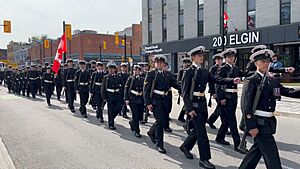
In Canada, the Freedom of the City is often given to individual units of the Canadian Forces. Many units celebrate this honor with special parades. For example, The Calgary Highlanders (10th Canadians) have an annual parade to remember the Battle of Kitcheners' Wood.
Key to the City
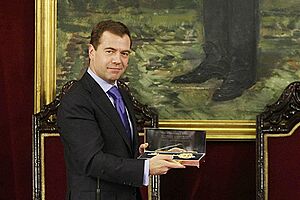
In some countries, like the United States, an ornamental key – the "key to the city" – is given to honored visitors or residents. This is similar to the Freedom of the City. It symbolizes that the person is a trusted friend and can enter and leave the city freely, just like someone with a key to a locked gate in an old walled city.
In some cities in the Netherlands, Belgium, and Germany, the key to the city is given to the 'Prins Carnaval' (Carnival Prince) who leads the carnival celebrations. This tradition means the mayor steps down for a short time, and power is given to the Carnival Prince. He then returns the key at the end of the carnival. This is mostly a fun, symbolic tradition today.
A similar tradition happens in Latin America, like at the Rio Carnival, where the festival's King Momo receives the key to the city to start the festivities. In Tampa, Florida, during the yearly Gasparilla Pirate Festival, costumed pirates playfully demand that the mayor surrender the key to the city.
In Canada, major cities like Toronto and Vancouver also give keys to the city to important business leaders, musicians, and politicians. In 2016, the musician Drake received a key to the city of Toronto from the mayor. In Calgary, instead of a key, they often give honored visitors a symbolic cowboy hat and ask them to say a fun oath to become honorary Calgarians.
Images for kids
-
Award to Sir Robert Hadfield by the City of Sheffield, 1939 (Hadfield Room, University of Sheffield)
-
"Ferdinand Receives the Keys of the City from the Virgin of Ghent", print after a painting made by Antoon van den Heuvel for the Joyous Entry by the Cardinal-Infante Ferdinand into Ghent in 1635
-
Mark Stephens with a sheep on London Bridge in 2009
-
Then Mayor of Rio de Janeiro Marcelo Crivella hands out key to the city to King Momo at the start of Carnival 2018.
 | Valerie Thomas |
 | Frederick McKinley Jones |
 | George Edward Alcorn Jr. |
 | Thomas Mensah |


